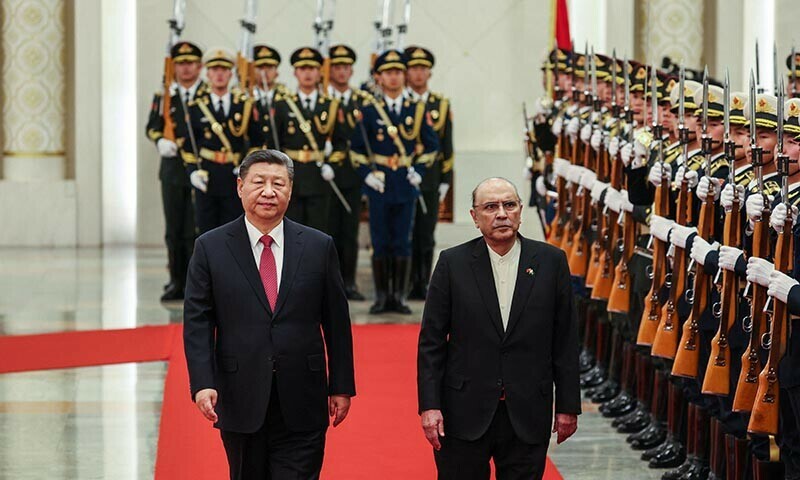China and Pakistan will upgrade and reconstruct the Pakistan’s railway network and further develop its Gwadar port, while Chinese companies can invest in the country’s offshore oil and gas developments, the official Xinhua news agency reported on Thursday.
The comments came as President Asif Ali Zardari visits China from February 4-8, where he will also attend the opening ceremony of the Asian Winter Games.
Chinese investment and financial support for the country since 2013 have been a boon for its struggling economy.
The two countries have had close ties underpinned by long-standing wariness of their common neighbour, India, and a desire to hedge against US influence across the region.
Pakistan and China recognised the importance of Pakistan’s “Gwadar Port and agreed to fully unleash its potential as a key node for connectivity and trade,” Xinhua said quoting a joint statement from the two countries.
Chinese-funded enterprises would be encouraged to “carry out mining investment cooperation in Pakistan” and cooperate in terrestrial and marine geological resources.
“Pakistan welcomes Chinese companies to participate in the development of offshore oil and gas resources in Pakistan.”
Longtime ally China has thousands of nationals working on projects grouped under the China-Pakistan Economic Corridor (CPEC).
The $65-billion investment is part of President Xi Jinping’s Belt and Road Initiative, designed to Beijing’s global reach by road, rail and sea.
‘Iron-clad friendship’
In a joint statement, the Foreign Office (FO) stated that the two countries reaffirmed “enduring partnership and iron-clad friendship between China and Pakistan”.
The FO said, “The two sides reaffirmed their unyielding support for each other on issues concerning their respective core interests and major concerns.”
Additionally, Pakistan reaffirmed its commitment to the one-China policy, highlighting that it viewed Taiwan to be “an inalienable part” of China and “the Taiwan question is the core of China’s core interests”.
“It firmly supports all efforts made by China to achieve national reunification and resolutely opposes all forms of ‘Taiwan independence’,” the FO said.
According to the statement, the countries also “reiterated their commitment to combating terrorism in all its forms and manifestations with a zero-tolerance attitude”.
Additionally, it stated that Pakistan will continue its “efforts to investigate into the terrorist attacks involving Chinese personnel”.
On October 6 2024, a massive explosion occurred on a road near Jinnah International Airport, killing a total of three people — including two Chinese engineers — and injuring at least 11 others.
The attack was claimed by the banned outfit Baloch Liberation Army (BLA). Police registered an FIR against leaders of the BLA and others three days after the incident.
Regarding the Belt and Road Initiative, the countries agreed to implement “the eight major steps” and jointly build a growth corridor, a livelihood-enhancing corridor, an innovation corridor, a green corridor and an open corridor aligned with Pakistan’s 5Es framework.
The government launched its 13th Five-Year Plan (2024-2029) in December called “Uraan Pakistan: Homegrown National Economic Plan”, which aims to address key economic challenges through a targeted framework called the “Five Es” — Exports; E-Pakistan; Equity and Empowerment; Environment, Food and Water Security; and Energy and Infrastructure.
The FO also confirmed that “efforts will be made to advance the upgradation of ML-1 in a phased and secure manner”.
“The two sides reiterated that the Karakoram Highway (Raikot-Thakot) realignment project is of great importance to the land connectivity between China and Pakistan,” it stated.
Furthermore, the two countries recognised the importance of the Gwadar Port’s role as a multimodel logistics hub to boost economic growth.
“During the visit, the two sides signed more than a dozen documents covering cooperation on CPEC, trade, science and technology, people’s livelihoods, and media,” the statement read.




